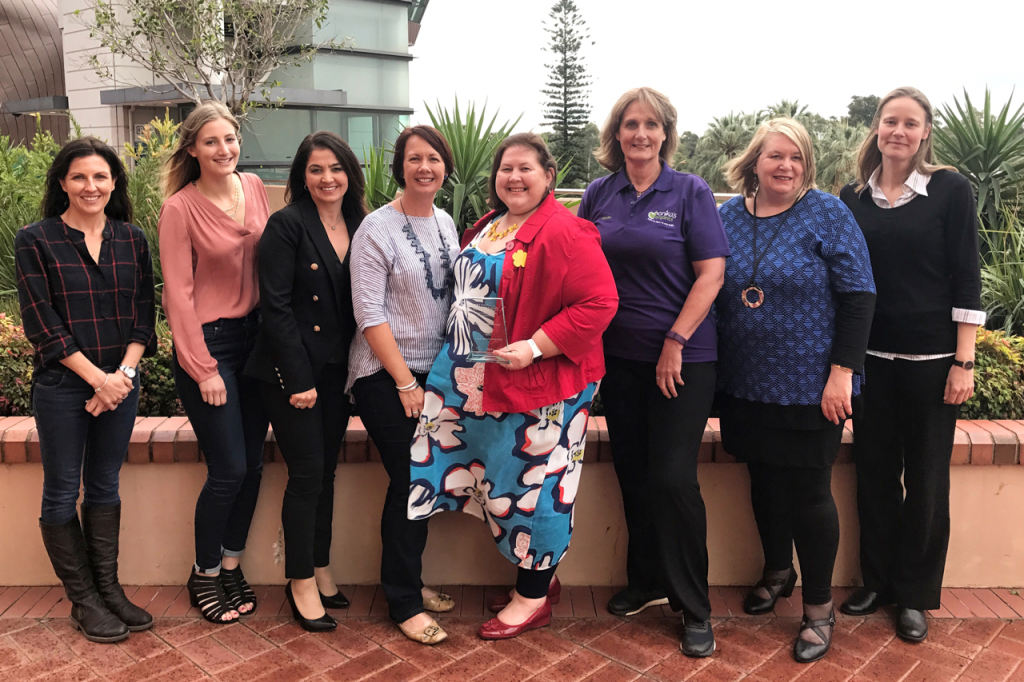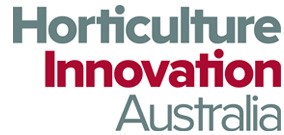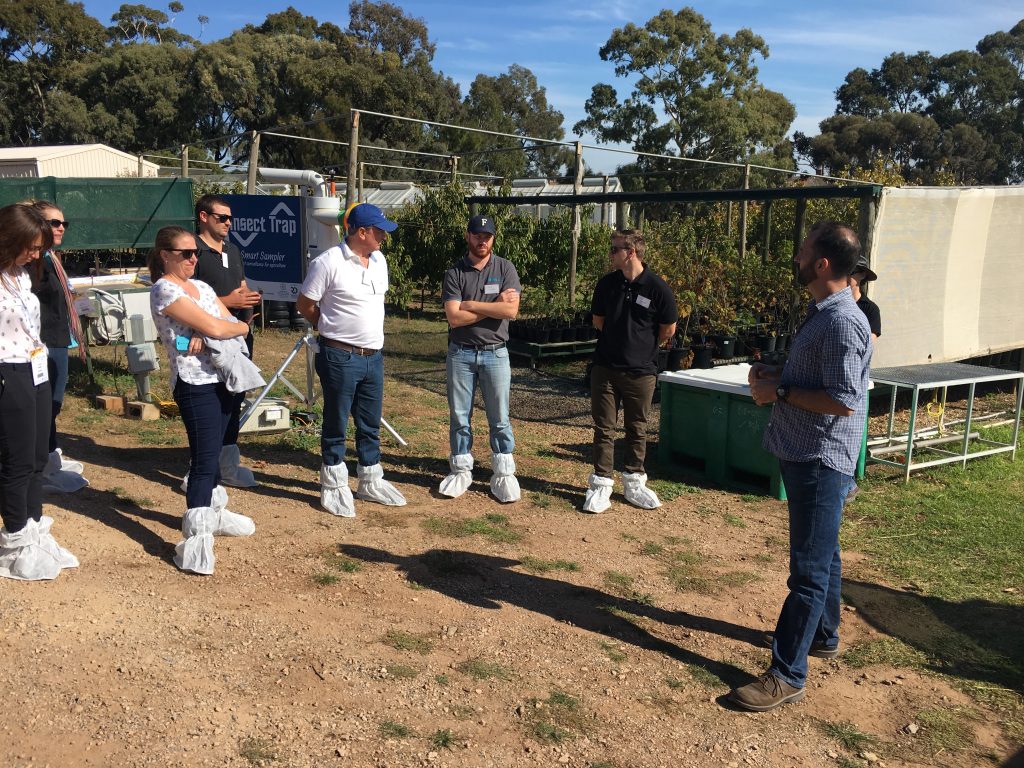AUSVEG Weekly Update – 23 May 2017
Hort Connections 2017 marks beginning of new era for Australian horticulture
The inaugural Hort Connections conference has become an instant success, with AUSVEG and PMA Australia-New Zealand joining forces to deliver the incredible three-day event alongside industry co-hosts Australian Organic, Onions Australia, Irrigation Australia, Central Markets Association of Australia, Fresh Markets Australia, Potatoes South Australia, Growcom and Nursery and Garden Industry Australia Limited.
Over 2,500 local and international delegates made their way to the Adelaide Convention Centre to attend Hort Connections 2017 from 15-17 May, taking part in a trade show featuring over 230 booths, enjoying a range of informative speaker sessions, and attending a series of educational and exciting side events.
Distinguished guests included Australian and international horticultural producers, buyers, supply chain members and AUSVEG’s Strategic Partners, without which the event would not have been such a stellar success.
AUSVEG would like to thank all industry co-hosts for their partnership in beginning this new era of Australian horticulture, as well as thank the delegates, speakers, Strategic Partners and exhibitors who attended for their support. We look forward to seeing you all in Brisbane from 18-20 June for Hort Connections 2018!
Vegetable industry’s best and brightest celebrated at Hort Connections Gala Dinner
Australia’s leading vegetable and potato growers and industry members were recognised at the Hort Connections 2017 National Awards for Excellence Gala Dinner on Wednesday 17 May, with around 1,100 attendees from every sector of Australian horticulture celebrating the significant contributions of the industry and its members.

The winners of the National Awards for Excellence, held at the Adelaide Convention Centre, were as follows:
- Anthony Staatz, Qld – Grower of the Year (proudly sponsored by Syngenta)
- Daniel Adams, Vic – Young Grower of the Year (proudly sponsored by Dow AgroSciences)
- Michael Tran, Vic – Community Stewardship (proudly sponsored by DuPont)
- Rijk Zwaan, Vic – Innovation Partner (proudly sponsored by Boomaroo Nurseries)
- Matthew Stein, SA – Researcher of the Year (proudly sponsored by Bayer)
- Lisa Brassington, Vic – Women in Horticulture (proudly sponsored by Steritech)
- Hills Transplants, Tas – Environmental Award (proudly sponsored by the Butler Market Gardens)
- Sundrop Farms, SA – Industry Impact (proudly sponsored by Visy)
- Sumich, WA – NAB Agribusiness Exporter of the Year
AUSVEG would also like to congratulate all nominees and winners for these prestigious awards, as well as congratulate the PMA Australia-New Zealand award winners who were also recognised for their achievements on the night.
Value-adding highlighted for women in horticulture
More than 250 delegates gathered at the annual Women in Horticulture networking event at Hort Connections 2017, recognising and celebrating the pivotal role that women play in the industry and highlighting the ways that they can get involved and add value to their businesses.

The event, sponsored by AUSVEG Strategic Partner Steritech, was held at the InterContinental Adelaide on Wednesday 17 May. It opened with an address from Assistant Minister for Agriculture and Water Resources, Senator the Hon. Anne Ruston, who provided an insight into her experience as a regionally-based senator with a passion for agriculture.
Eat.Drink.Innovate Pty Ltd founder Susie White gave a presentation on the ways attendees could incorporate new product and packaging innovations into their businesses, and celebrity chef Geoff Jansz used local produce in a cooking demonstration to explain the easy ways to bring professional cooking into the home.
The event concluded with the announcement of the 2017 Women in Horticulture award winner, Victorian organic grower Lisa Brassington, who received the award from 2016 winner Sharron Windolf.
Rural mental health concerns highlighted at Hort Connections Mental Health Panel
Mental health issues and their impact on individuals and communities in regional Australia were highlighted at Hort Connections 2017, with a Mental Health Panel contributing to ongoing industry efforts to break the stigma of mental health issues.
The headline speaker at the session was beyondblue Chairman and former Victorian premier Jeff Kennett, who discussed the prevalence of depression in rural areas of Australia, as well as looking at tactics to help assist those who are struggling.
A panel discussion and question-and-answer session followed Mr Kennett’s address, with Mal Coutts from Talk to a Mate, Linda Bertram from the South Australia Country Women’s Association and Stu Jennings, Victorian potato grower and founder of Young Potato People, taking to the stage to answer the audience’s questions about rural mental health and the ways that issues can be addressed.
If this topic raises any concerns for you, please contact one of the following services:
Lifeline: 13 11 14
beyondblue: 1300 22 4636
Kids Help Line: 1800 55 1800
2017 Global Innovations in Horticulture Seminar inspires attendees
Over 200 attendees were inspired by presentations from international innovation experts on new and emerging technologies in horticulture at the 2017 Global Innovations in Horticulture Seminar. The seminar was funded by Horticulture Innovation Australia using the vegetable research and development levy and funds from the Australian Government.
Headlining the seminar’s speaker list was Agfunder’s Michael Dean, who spoke about trends in investment in agriculture. Mr Dean was joined by a collection of other speakers, with a highlight being Wageningen University’s Frans Kampers presenting on the use of technology to meet challenges in the agricultural and food sectors. Attendees also heard the Association for Vertical Farming’s Henry Gordon-Smith discuss the benefits of vertical farming.
Videos and presentations will be made available online in the coming weeks. AUSVEG looks forward to continuing to deliver the Global Innovations in Horticulture seminar series at next year’s Hort Connections in Brisbane in 2018.
| The 2017 Global Innovations in Horticulture Seminar was funded by Horticulture Innovation Australia using the national vegetable research and development levy and funds from the Australian Government. |  |
Vegetable growers inspired to break into export markets
Australian vegetable growers have been given a practical overview of the export process, including the tricks of the trade to take advantage of booming export markets, at the Australian Vegetables Export Seminar 2017, held on Monday 15 May at Adelaide Convention Centre.
The seminar, organised by AUSVEG and funded by Horticulture Innovation Australia, ran in conjunction with Hort Connections 2017, and featured a range of speakers providing invaluable insights into the procedures and processes required when exporting vegetables.
Headlining the list of speakers for the event was agribusiness expert Dr David McKinna, who discussed the recently published Vegetable Industry Export Strategy. Dr McKinna was joined by a number of other expert speakers, who explored different aspects of vegetable exporting, including Food Innovation Centre’s Angeline Achariya, Swisse Wellness’ Simon Woolmer and Chris Schreurs of Schreurs & Sons, who headed a grower panel allowing successful vegetable exporters to share their experiences with all attendees.
Videos and presentations will be made available online in the coming weeks. AUSVEG looks forward to next year’s Australian Vegetables Export Seminar at Hort Connections 2018.
| The Australian Vegetables Export Seminar 2017 was funded by Horticulture Innovation Australia using the national vegetable research and development levy and funds from the Australian Government. |  |
2017 Horticulture Field Day showcases industry innovations
Australian growers received a valuable look at innovations taking place in the South Australian vegetable industry at the annual Horticulture Field Day on Monday 15 May, with this year’s event taking growers to key industry locations in Adelaide and surrounds.

Growers and industry members who took part in the Field Day were given insights into three aspects of innovation in the vegetable industry: a visit to a TORO Australia facility, highlighting the innovations taking place in the supply chain; a visit to the South Australian Research and Development Institute (SARDI), showcasing the work done by researchers; and a visit to a Soil Wealth and Integrated Crop Protection field trial site at Brussels sprout grower Eastbrooke Farms, showing the benefits of on-farm development.
2018 Nuffield Scholarships – Applications now open!
Applications for the 2018 Nuffield Scholarships for Australian Primary Producers are now open.
Aiming to develop current, emerging and future leaders within Australian industries, each scholarship offers a $30,000 bursary to enable the successful applicants to study cutting-edge global agriculture.
A range of scholarships are available across multiple industries, including a vegetable grower scholarship supported by Horticulture Innovation Australia.
For more information on these scholarships and information on how to apply, please click here.
| The 2018 Nuffield Scholarship for the vegetable industry is funded by Horticulture Innovation Australia using the national vegetable research and development levy and funds from the Australian Government. |  |
AUSVEG seeking Agrichemical Project Coordinator
AUSVEG is seeking an Agrichemical Project Coordinator to work on the Agrichemical Pest Management Needs and Priorities project.
This project’s objective is to coordinate vegetable industry agrichemical pest needs by identifying and prioritising potential gaps through implementation of an effective prioritisation process for the industry. Successful roll out of the program will result in an effective agrichemical prioritisation process for the vegetable industry through a high level of industry engagement and input.
For more information, please refer to the job advertisement. Please email employment@ausveg.com.au to request a full Position Description.
| This communication has been funded by Horticulture Innovation Australia using the national vegetable research and development levy and funds from the Australian Government. |  |
Protected Cropping Workshop
VegNET will run a Protected Cropping workshop on Wednesday 31 May 2017.
The workshop will focus on a variety of topics, including fusarium resistant rootstocks, controlling mites and the benefits of growing your business through VegNET.
Presenters on the day will include Len Tesoriero, Andy Ryland and Saskia Blanch. The workshop will be run in both English and Arabic.
The event will take place at the farm of Joe Boustani, 55 Herley Avenue Rossmore, NSW. The presentations and farm walk will begin at 11:00am, with a Lebanese BBQ lunch taking place at 1:00pm.
For further information please contact:
Joe Boustani: 0417 446 044
Ryan Fadd: 0423 030 013
Matt Plunkett: 0428 978 390.
To RSVP, please contact Renee Pearson by 26 May on 02 4724 2121 or at veg.network@lls.nsw.gov.au.
| VegNET is funded by Horticulture Innovation Australia using the national vegetable research and development levy and funds from the Australian Government. |  |
Using an Integrated Pest Management strategy to manage psyllids
In 2008, a study project into control options within an Integrated Pest Management (IPM) strategy was undertaken, to prepare for an Australian incursion of the tomato potato psyllid.
Based off work undertaken in New Zealand, the project looked at methods which had been effective or ineffective in New Zealand’s potato crops, and developed a strategy from here.
In previous studies, it was confirmed that brown lacewings, hoverflies, damsel bugs and a species of ladybirds all accepted psyllids as prey, even in the presence of alternative prey such as aphids. This means that the generalist predators that are present in Australian potato crops are going to be extremely important in controlling potato psyllid.
Field trials in Canterbury, New Zealand, confirmed that the draft IPM strategy could be used to control all pests, including TPP. This draft strategy involved the use of biological control agents, some cultural methods and the use of selective insecticides.
IPM Technologies and collaborators showed that control of TPP is possible without reliance on heavy use of insecticides. Since this work was funded, newer selective chemistries have been developed that are softer and with greater efficacy, which means that managing the psyllid using IPM can be an effective and viable option for Australian potato growers.
For a more detailed look into the possibilities of using an IPM strategy for psyllid control, please see page 16 of the latest edition of Potatoes Australia magazine, which can be found here.
A booklet on IPM was included with last month’s edition of Vegetables Australia magazine, and will also be in the forthcoming mailout of Potatoes Australia magazine.
| Potatoes Australia is funded by Horticulture Innovation Australia using the national fresh potato research and development levy and funds from the Australian Government. |  |
Calcium Cyanamide use in vegetables
Calcium cyanamide, also known as nitrolime, has been used as slow release nitrogen / calcium fertiliser with liming effect for over 100 years. Because of its negative effect on many soil borne diseases, it is now often applied to prevent yield and quality losses during increasingly tight crop rotations.
Calcium cyanamide can be used:
- As a non-acidifying, slow release nitrogen fertiliser;
- To reduce soil borne disease pressure;
- To suppress weed germination; and
- As an additive to compost.
This fact sheet explains how the product works, how to use it in vegetables and how to handle and store it safely. Ask your agronomist about sourcing calcium cyanamide products.
To find out more about the Soil Wealth and ICP projects visit the website, or join the Community of Practice online. You can also follow the projects on Twitter @SoilWealth and @ProtectingCrops.
| Soil Wealth and Integrated Crop Protection are funded by Horticulture Innovation Australia using the national vegetable research and development levy and funds from the Australian Government. |  |
RIPPA heads east to Lindenow, Victoria
The Robot for Intelligent Perception and Precision Application (RIPPATM) was featured at the recent East Gippsland Vegetable Innovation Days in Lindenow, Victoria.
This was part of a week-long trial at Bulmer Farms, following similar data collection on commercial farms in Tasmania, Queensland and Clyde in Victoria over the past six months.
Created through the Horticulture Innovation Centre for Robotics and Intelligent Systems in the University of Sydney’s internationally-recognised Australian Centre for Field Robotics, RIPPATM aims to benefit the vegetable industry by:
- Operating autonomously 24 hours a day, seven days a week;
- Automatically removing weeds through a wide variety of implements;
- Autonomously detecting and removing foreign objects;
- Determining crop health and soil status;
- Conducting autonomous precision spraying on each individual plant; and
- Monitoring crop growth and estimating yield through intelligent data analytics.
Over 500 people attended the field day and had the opportunity to talk one-on-one with the University of Sydney research team. This included providing an overview of the sensor systems, decision support tools, and how the robot interacts with crops while having the chance to view the robot operating autonomously nearby.
For more information on the event or where to see RIPPATM next, please click here.
| This project has been funded by Horticulture Innovation Australia using the national vegetable research and development levy and funds from the Australian Government. |  |
Sponsored: Solar minus the panels
The power market is changing. Electricity is a significant cost for Australian growers with direct impact to their bottom line. They need new ways to buy power.
Solar is an abundant resource in Australia. As of April 2017, there were more than 1.66 million solar PV installations in Australia – many of these on commercial operations. However, upfront costs and availability of space are common hurdles for businesses wanting to invest.
Flow Power has an internationally tested solution for setting up solar: Corporate Power Purchasing Agreements. It’s solar minus the panels. From Google to Nestle, businesses are taking on Corporate Power Purchasing Agreements for long-term affordability and improved price visibility.
Put simply, businesses buy solar energy in bulk direct from the plant. This lets the experts generate the power so you can get on with business. Australian growers can lock in prices as low as 8-10c/kW for up to 20 years.
Solar developers are calling out for businesses to buy their power. These projects are capital intensive and lock-in contracts allow them to get the necessary funding. Once set up, operational costs stay low – which means energy costs to businesses stay down.
Since 2008, Flow Power has been working with Australian agribusinesses to give them more choice, control and transparency in their energy costs.
On 25 May 2017, Flow Power is hosting a one-off webinar on Corporate Power Purchasing Agreements. For more information, speak to one of Flow Power’s advisors on 1300 08 06 08 or visit flowpower.com.au.
Seasonal Work Incentives Trial
What is the Seasonal Work Incentives for Job Seekers Trial?
The Australian Government is introducing the Seasonal Work Incentives Trial on 1 July 2017 to help meet the seasonal labour demands of horticultural growers. The two-year Trial aims to encourage job seekers to take up short-term work placements of six weeks by providing them with an opportunity to earn additional income, without affecting their income support payment.
Job seekers can also receive a travel and living away allowance if the work is located more than 120km from their home.
How can I participate in the Trial?
The Trial will be managed from 1 July 2017 by jobactive, Transition to Work and Disability Employment Services providers. Providers will receive a weekly incentive payment for up to six weeks for placing an eligible job seeker into seasonal horticultural work. They will work closely with you to ensure that they are matching the right workers to your jobs.
If you want to participate in the Trial you should contact a provider to discuss your labour needs. Providers are located across Australia, and their contact details are available at jobsearch.gov.au/providers (search by provider type and location).
Where can I find more information?
The Department of Employment is conducting morning and afternoon tea information sessions during May and June for horticultural growers and employment service providers across Australia. These sessions will provide further information on the Trial as well as a great opportunity for growers to network with employment service providers to discuss their labour needs.
The sessions are expected to run for around 1.5 hours.
A full schedule for the sessions can be found here. To register your interest, please contact info@ausveg.com.au or directly to the Department of Employment at SWIT@employment.gov.au.
Current project opportunities with Hort Innovation
Hort Innovation advertises opportunities to become a delivery partner on research, development and marketing projects for Australian horticulture on its website and on tenders.net.
Join Hort Innovation’s delivery partner mailing list to receive email notifications of new opportunities by registering through its delivery partner registration form.
The relevant documentation for each opportunity is available on tenders.net. To access this information, you will need to become a member by registering on the tenders.net registration page.
Please find below a table of current project opportunities directly related to the Australian vegetable and potato industries. For more details on any of the projects, or for information on other project opportunities across horticulture, please visit tenders.net.
| Type | Title | Closing date |
| Request for proposal | Tools and interventions for increasing children’s vegetable consumption | 5pm (Sydney time) Wednesday 24 May 2017 |
| Request for proposal | Vegetable digital asset redevelopment – Veggycation website | 5pm (Sydney time) Friday 26 May 2017 |
| Request for proposal | Soil Wealth and Integrated Crop Protection – Phase 2 | 4pm (Sydney time) Friday 16 June 2017 |
| Communication of levy-funded R&D is funded by Horticulture Innovation Australia using the national vegetable and potato research and development levies and funds from the Australian Government. |  |
New Minor Use permits
| Permit ID | Description | Date Issued | Expiry Date | Permit Holder | States |
| PER14431 V2 | Actives: Tolclofos-Methyl Crop: Lettuce (field grown) Pest: Bottom rot (Rhizoctonia solani) |
21-Mar-2014 | 30-Jun-2022 | Horticulture Innovation Australia Limited | All states except Victoria (Note: Victoria is not included in this permit as their Control-of-Use legislation means that an APVMA permit is not required to legalise this off-label use in that State) |
All efforts have been made to provide the most current, complete and accurate information on permits. However, AUSVEG recommends that you confirm the details of any permits at the APVMA website.
Users are advised that while the pesticide can be applied legally under the APVMA minor use permit, there can be a significant delay until the maximum residue limit (MRL) gazetted by the APVMA is adopted in the Australia New Zealand Food Standards Code.
Until this occurs the MRL may not be recognised and a zero tolerance may be imposed for residues of the pesticide resulting from its use according to the APVMA permit.
Please be aware that in the absence of a MRL in the Food Standards Code, the use of the pesticide according to the permit may result in the suspension of the produce in the marketplace. Please check the FSANZ website or the Australian Government ComLaw website to confirm if there are MRLs established by the Australia New Zealand Food Standards Code.
Please consult APVMA documentation before applying any product to your crop. For more information contact the APVMA on (02) 6210 4701.
If an adverse experience occurs as a result of using the permit, please fill out a Non-Performance Reporting Form for Horticultural Pesticides and return to jodie.pedrana@horticulture.com.au. To download a Non-Performance Reporting Form for Horticultural Pesticides, please click here.
| This communication has been funded by Horticulture Innovation Australia using the national vegetable research and development levy and funds from the Australian Government. |  |
AUSVEG in the media
AUSVEG National Manager – Public Affairs Jordan Brooke-Barnett appeared on radio this week discussing the proposed reforms to Australia’s skilled migration system. Mr Brooke-Barnett noted that growers are currently dealing with worker shortages, leaving vegetables unable to be picked and thus causing waste.
AUSVEG National Manager – Communications Shaun Lindhe appeared on television this week discussing fresh and frozen vegetables. Mr Lindhe noted that in many cases frozen vegetables are a viable alternative to fresh vegetables for consumers, and utilising frozen produce more often may help to reduce food wastage.
Mr Lindhe also appeared on radio this week, discussing a number of events which occured at and adjacent to Hort Connections 2017, noting that the wide range of events on offer during the conference meant that those from all sectors of the industry were able to benefit from attending.
AUSVEG National Manager – Science and Extension Dr Jessica Lye appeared in print media this week discussing the success of the 2017 Horticulture Field Day. Dr Lye noted that the field day provided an invaluable opportunity for industry members to establish networks, share experiences and learn about the latest innovations in horticulture.
AUSVEG VIC Executive Officer Kurt Hermann appeared in print media this week discussing labour shortage in the vegetable industry. Mr Hermann noted that this was a critical issue for the industry, and may hinder farmers in maximising their produce.
